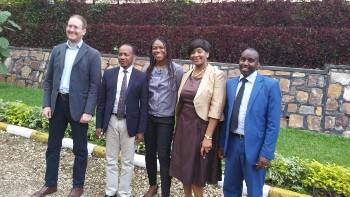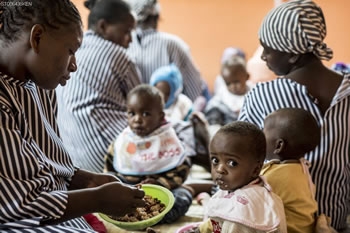Delivering Nepal’s Commitment to Uphold Economic, Social and Cultural Rights

In the wake of Nepal’s 2015 Constitution, which significantly broadened the scope for human rights’ protection, iProbono and the Law and Policy Forum for Social Justice have partnered to promote economic, social and cultural rights in the country with support from the ROLE UK Programme.
A decade of civil war, fought between the Communist (Maoist) Party of Nepal and the Nepalese government, ended with a peace deal in 2006 and the promise to draw up a new constitution. Characterised by executions, massacres, kidnapping and other war crimes, the Nepalese Civil War claimed the lives over 17,000 people and caused the internal displacement of hundreds of thousands more.
After eight years of political and civil struggle in the aftermath of the war, in September 2015 a sufficient level of consensus was reached for the new Constitution to be set in place as a foundation for change. Its long-awaited arrival was heralded by many within and outside of Nepal as a success for democracy and human rights, as well as an opportunity to promote peace and stability across the country. Importantly, Part 3 of the new Constitution (Arts. 16-47) sets out 31 key fundamental rights’ guarantees, including core economic, social and cultural rights for the people of Nepal. The document also included an article which mandated the state to make legal provisions for the implementation of these rights available by 19 September 2018.
“This Constitution ensures our identity, rights, participation and inclusion; a better path ahead for Nepalese LGBTs,” Sunil Pant, Nepalese rights activist and former politician
The inclusion of human rights provisions in Nepal’s latest Constitution marks a shift towards strong civic and political support for equality and social justice in the country. The provisions have been widely welcomed by supporters of civil rights, although not without some critics, in the face of centuries of systemic and culturally entrenched discrimination related to gender, caste, ethnicity and sexuality.
Facilitating peer-to-peer learning to build lawyers’ expertise
The ROLE UK-supported partnership was spearheaded in 2017 by local and regionally based NGOs that recognised that Nepal’s new Constitution represented an important opportunity to engage the legal community in the processes to enshrine new economic, social and cultural rights protections into the law. In collaboration with these legally focused NGOs, iProbono and the Law and Policy Forum for Social Justice (LAPSOJ) seek to address identified gaps in technical legal knowledge and support Nepalese lawyers to develop their expertise in social and economic rights’ litigation to drive forward law making processes.
The parties to the partnership not only share an agenda to promote social, economic and cultural rights, but also recognise that to fully realise this long-fought breakthrough in the law requires the careful support of a sensitised legal community, that have not previously had the opportunity to use the law to protect civil rights in Nepal. To this end, the partnership brings together various stakeholders, including members of the Nepalese Judiciary, Nepalese lawyers, and legal economic, social and cultural rights experts from the UK, Kenya and India, to share in peer-to-peer learning and enable the legal community to constructively engage in law-making processes to implement the 2015 Constitution.
Since 2017, with the ROLE UK Programme’s technical support, the partnership has delivered trainings on socio-economic rights litigation to Nepalese lawyers, representatives from local government and law students. The partnership has also organised more in-depth workshops and mentoring support for a specific group of Nepalese lawyers. This dedicated group of eleven research Fellows are facilitated by the partnership to conduct legal research on a pro bono basis, including legislative reviews, with the aim to expand legal knowledge and resources on social, economic and cultural rights in Nepal. With iProbono’s and LAPSOJ’s support, the Fellows are currently reviewing the following acts: Reproductive Health Act, Consumer Protection Act, Children’s Act, Education Act, Right to Food Act, Environment Act, Social Security Act, Public Health Act, Housing Act, and Employment Act.
Supporting the development of effective legislation
Through the partnership’s continued efforts to improve the capacity of Nepalese lawyers to constructively contribute to the law-making process, iProbono and LAPSOJ hope to ensure that the rights enshrined within the Constitution are appropriately shaped and drafted in legislation and policy. This will allow legal economic, social and cultural rights’ cases to be litigated in the courts with consistency and provide protection for all citizens, including those from the most marginalised communities.
In their specialist professional capacity, lawyers can act as custodians of the law and mitigate the risk that such rights protections are limited or weakened as they take form in the law. The partnership’s activities are intended to increase lawyers’ theoretical and technical knowledge, understanding and therefore capacities in litigating these new areas of the law that concern economic, social and cultural rights.
The value of the partnership was acknowledged by the Nepalese parliament in September 2018, when the partners were asked to provide legal opinions and recommendations in regards to seven draft pieces of legislation concerning social, economic and cultural rights. In response, the partnership facilitated a consultative workshop to focus on the proposed legislation. The result of this workshop was a collaborative set of recommendations which were passed on to parliament for their consideration. The draft legislation has since been adopted by Parliament.
The partnership’s continued work demonstrates the integral role of lawyers – working in collaboration with civil society and governments – in promoting the Rule of Law. By working to ensure Nepal’s new economic, social and cultural rights provisions are legally enforced, A4ID hopes that the long-term impact of the partnership’s activities will be to reduce inequalities (SDG 10) and thereby promote political stability throughout Nepal (SDG 16).

